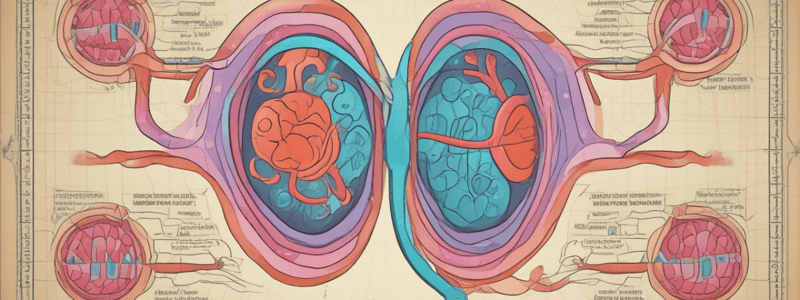Podcast
Questions and Answers
What is the primary purpose of a concentration test in the context provided?
What is the primary purpose of a concentration test in the context provided?
- To identify potential infections in the urinary tract
- To measure the amount of urine produced by the kidneys
- To assess the ability of the bladder to store urine
- To determine the concentration of solutes in the urine (correct)
Why is the morning urine specimen discarded in a concentration test?
Why is the morning urine specimen discarded in a concentration test?
- Because it is not collected under controlled conditions
- Because it is not representative of the urine's concentration after a period of dehydration
- Because it is contaminated with bacteria overnight
- Because it reflects the overnight fluid intake, not the current kidney function (correct)
Which of the following is NOT a possible reason for a low concentration test result?
Which of the following is NOT a possible reason for a low concentration test result?
- Diabetes insipidus
- Excessive fluid intake
- Dehydration (correct)
- Chronic kidney disease
In the context provided, what is the most likely meaning of the word "stable"?
In the context provided, what is the most likely meaning of the word "stable"?
What is the primary function of the bladder in the urinary system?
What is the primary function of the bladder in the urinary system?
Which of the following conditions could potentially affect the results of a concentration test?
Which of the following conditions could potentially affect the results of a concentration test?
What is the primary function of the kidneys in the urinary system?
What is the primary function of the kidneys in the urinary system?
What is the most likely reason for a high concentration test result?
What is the most likely reason for a high concentration test result?
Which of the following is a potential consequence of a consistently low concentration test result?
Which of the following is a potential consequence of a consistently low concentration test result?
Which of the following factors can influence the concentration of urine?
Which of the following factors can influence the concentration of urine?
Flashcards are hidden until you start studying
Study Notes
Tests for Assessing Tubular Function
- Urine concentration test and urine dilution test are used to assess tubular function
- Specific proteinuria or tubular proteinuria, aminoaciduria, and phenosulfonphthalein (PSP) test are also used
Blood Analysis
- Blood analysis of urea and creatinine is used to assess renal function
- Impairment of renal function results in elevation of blood urea (normal: 20-40 mg/dl) and creatinine (normal: 0.5-1.5 mg/dl)
- Creatinine is more sensitive than urea due to its less reliance on dietary protein and liver function
Microscopic Examination
- Microscopic examination of urine involves analysis of cells (RBC, WBC, and pus cells), crystals (calcium phosphate, ca.oxalates, and amorphous phosphates), and casts (hyaline casts, granular casts, and RBC casts)
Urine Specific Gravity
- Urine specific gravity is an indicator of osmolality
- Normal specific gravity is 1.015-1.025
- Fixed specific gravity at 1.010 (isosthenuria) is an early manifestation of renal damage
- Concentration test involves emptying the bladder and discarding the morning specimen
Studying That Suits You
Use AI to generate personalized quizzes and flashcards to suit your learning preferences.




